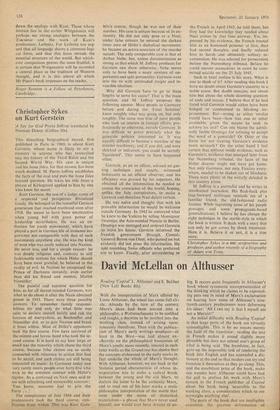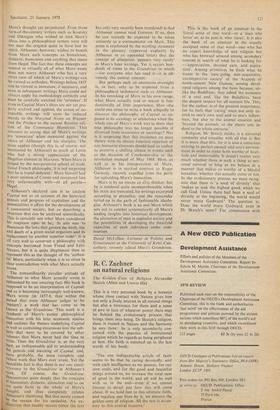David McLellan on Althusser
Reading 'Capital' L, Althusser and E. Balibar (New Left Books 80s) With the interpretation of Marx offered by Louis Althusser, the wheel has come full
cir- cle. Already by the turn of the century Marx's ideas had- been erected into a philosophy, a Weltanschauung to be cgidified and taught, a doctrine to be instilled into the working class, instead of arising spon- taneously therefrom. Then with the publica- tion of Marx's early writings emphasis—at least in the West—was laid almost ex- chtsively on the philosophical humanism of Marx's youth; more recently, interest in such later works as the Grundrisse has shoWn that the concepts elaborated in the early works in fact underlie the whole of Marx's thought. With Althusser, however, we are back in the Stalinist period characteristic of .whose in- terpretation was to make a radical break between the young and the old Marx, to declare the latter to be the authentic Marx, and to read out of his later works a static philosophic interpretation of the world that went under the name of dialectical materialism—a phrase that Marx never used himself, nor would ever have dreamt of us-
ing. It occurs quite frequently in Althusser's book whose systematic misrepresentation of the thinking which he claims to be expound- ing puts one in mind of Marx's exclamation on hearing how some of Althusser's nine- teenth-century predecessors were deforming his ideas: 'All I can say is that 1 myself am not a Marxist!'
An initial difficulty with Reading 'Capital' is that large parts of the book are virtually unintelligible. This is by no means merely the fault of the translator: reading the text in French makes it sound slightly more plausible but does not extend one's grasp of what is being said. The translator, in fact, gave-up the impossible task of rendering the book into English and has appended a dic- tionary at the end so that readers can try and translate it themselves as they go along. This, and the exorbitant price of the book, make one wonder how Althusser could have had the gall to preface his work with Marx's remark to the French publisher of Capital about his book being 'accessible to the working class, a consideration which to me outweighs anything else'.
The parts of the book that are intelligible constitute the greatest deformation of
Marx's thought yet perpetrated. Even those turn-of-the-century writers such as Kautsky and Diktzgen who wished to turn Marx's ideas into a philosophical system were still too near the original quite to have lost its spirit. Althusser, however, wishes to banish from Marx such concepts as historicism, dialectic, humanism and anything that sterns from Hegel. The fact that these concepts are central to virtually all of what Marx wrote does not worry Althusser who has a very strict view of which of Marx's writings can be viewed as orthodox. Writings before 1857 can be viewed as immature, if necessary, and even in subsequent writings Marx could not always apply his methodOlogy correctly and must be carefully watched for 'mistakes'. If even in Capital Marx's ideas are not yet pro- perly evolved and applied, the canon of ac- ceptable writings will soon be reduced merely to the Marginal Notes on Wagner and the Preface to the second Russian edi- tion of the Communist Manifesto. This amounts to saying that all Marx's writings are 'immature' when measured against the views of Althusser and his disciples. The same applies (though this is, of course, not mentioned by Althusser) to much of Lenin who had a strong appreciation of the Hegelian eleinent in Marxism. When Marx is judged by the neo-positivist school of tradi- tional French philosophy, it is not surprising that he is found deficient : Marx himself had a poor opinion of Comte and compared him. very unfavourably with—of all people— Hegel.
Althusscr's declared aim is to analyse Capital not as an account of the historical genesis and progress of capitalism and the Potentialities it offers for the development of a communist society, but as describing a structure that can be analysed scientifically. This is certainly not what Marx 'considered his magnum opus to be its aim was `to illuminate the laws that govern the birth. life and death of a given social organism and its replacement by another superior order'. It is all very well to construct a philosophy with concepts bort:owed from Freud and Levi- Strauss, but it. is quite illegitimate then to represent this as the thought of the 'authen- tic' Marx, particularly when it is so often in clear contradiction with what Marx actually wrote.
The extraordinarily cavalier attitude of Althusser to what Marx actually wrote is epitomised by one amazing fact. His book is supposed to be an interpretation of Capital; and as is becoming increasingly well-known, Marx wrote (in 1857-8, thus within the ,Period that even Althusscr judges to be `Mature') a work that has come to be known as the Grundrisse. This work is a synthesis of Marx's earlier philosophical humanism with his later economic studies and outlines the themes underlying Capital Its well as containing excursions into the sub- jects that were to be covered by other volumes that Marx never had the time to Write. Thus the Grundrisse is, at the very least, an indispensable aid to understanding the genesis and meaning of Capital, and, snore probably, the most complete and richest work that Marx ever wrote. Yet the incredible fact is that there is not one single reference to the -Grundrisse in Althusser's work. Of course, the Grundrisse demonstrates quite deeply that the concepts Of humanism, dialectic, alienation and so on are quite basic to the whole of Marx's thought, and thus completely refutes 'llhosser's theorising. But that surely cannot be the reason for his omission. An ex-
Planation that readily occurs (since the text
has only very recently been translated) is that Althusser cannot read German. if so, then he can scarcely be expected to be taken seriously as a commentator on Marx. This point is reinforced by the startling statement in the glossary (approved explicitly by Althusser in an appended letter) that the concept of alienation 'appears very rarely' in Marx's later writings. Yet it occurs hun- dreds of times in the Grundrisse to which —for everyone who has read it—it is ob- viously the central concept.
But perhaps such an enormous oversight is, in fact, only to be expected from a philosophical technocrat such as Althusser. In his remaking of Marx in his own image, what Marx actually said or meant is fun- damentally of little importance. How else could one come to write a book allegedly to discover the philosophy of Capital as op- posed to its sociology or eConomics when the whole aim of Marx's work was to show that true philosophy was no longer possible if divorced from economics or sociology? Nor is it surprising that this insistence on pure theory with its almost fanatical rejection of any humanist elements should lead its author to preserve a chilling silence in events such as the invasion of Czechoslovakia or the revolution manqué of May 1968. Here, as well as in his interpretation of Marx, Althusser is in marked contrast to Roger Garaudy, recently expelled from the party for upholding Marx's humanism.
Marx is by no means an easy thinker; but he is rendered quite incomprehensible when his texts are truncated, his writings excerpted according to prejudice, and the remainder tarted-up in the garb of fashionable ideolo- gies. Althusser's book is an anti-Marx which sets out to combat systematically all Marx's leading insights into historical development, the alienation of man in capitalist society and the possibilities of developing the manifold capacities of each individual under com- munism.
David McLellan, Lecturer in Politics and Government at the University of Kent, Can- terbury, recently edited Marx's Grundrisse.






































 Previous page
Previous page